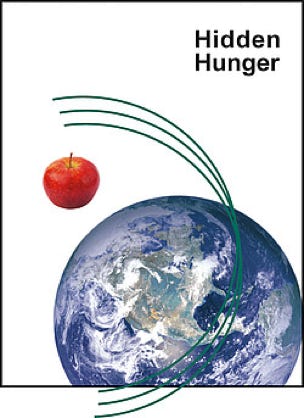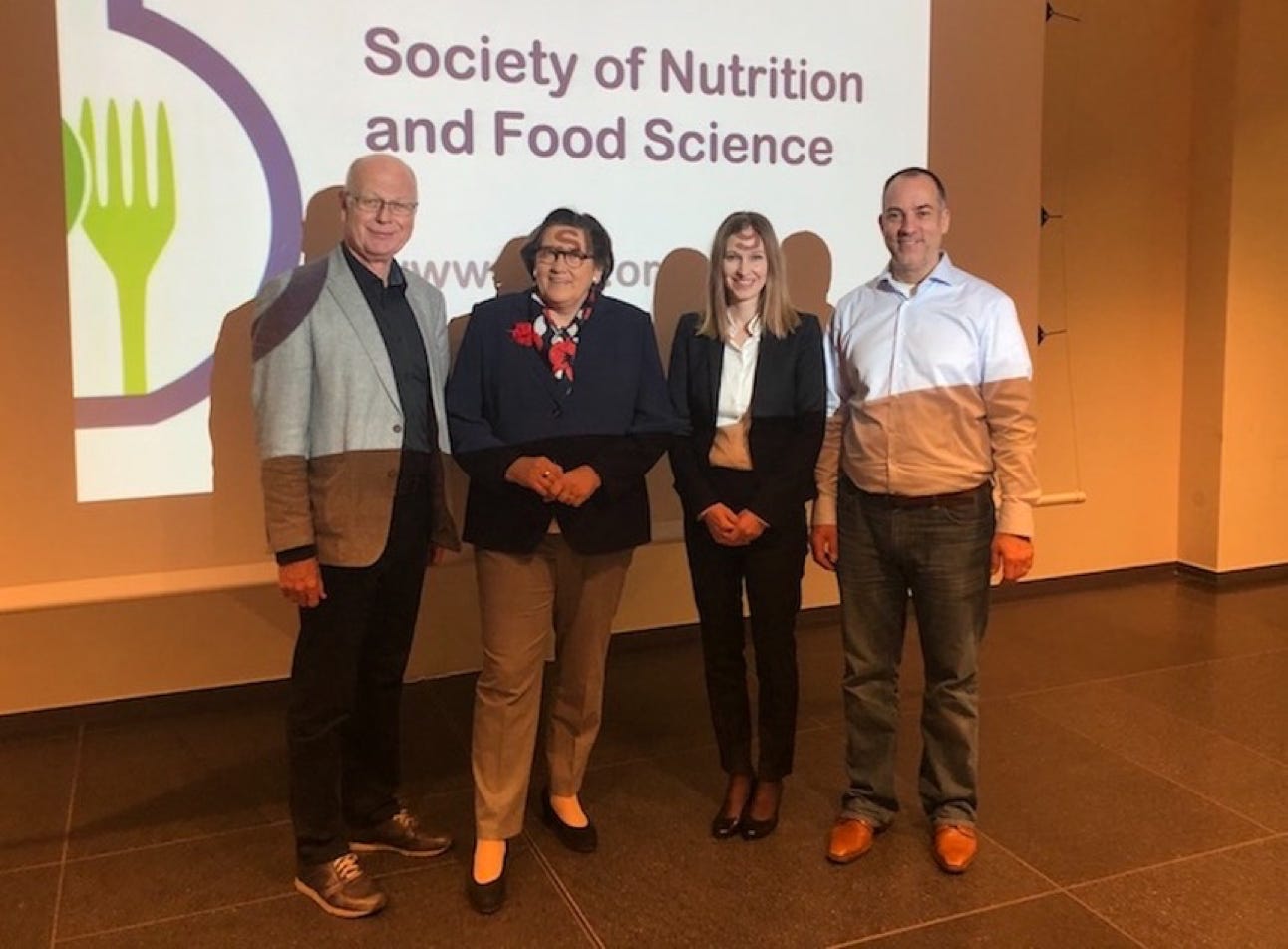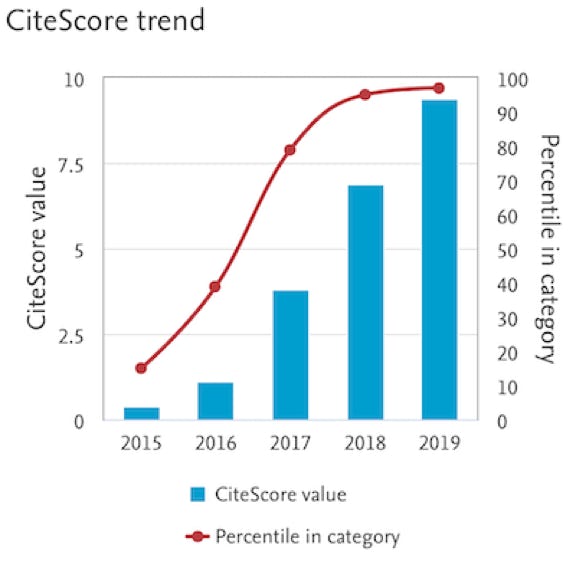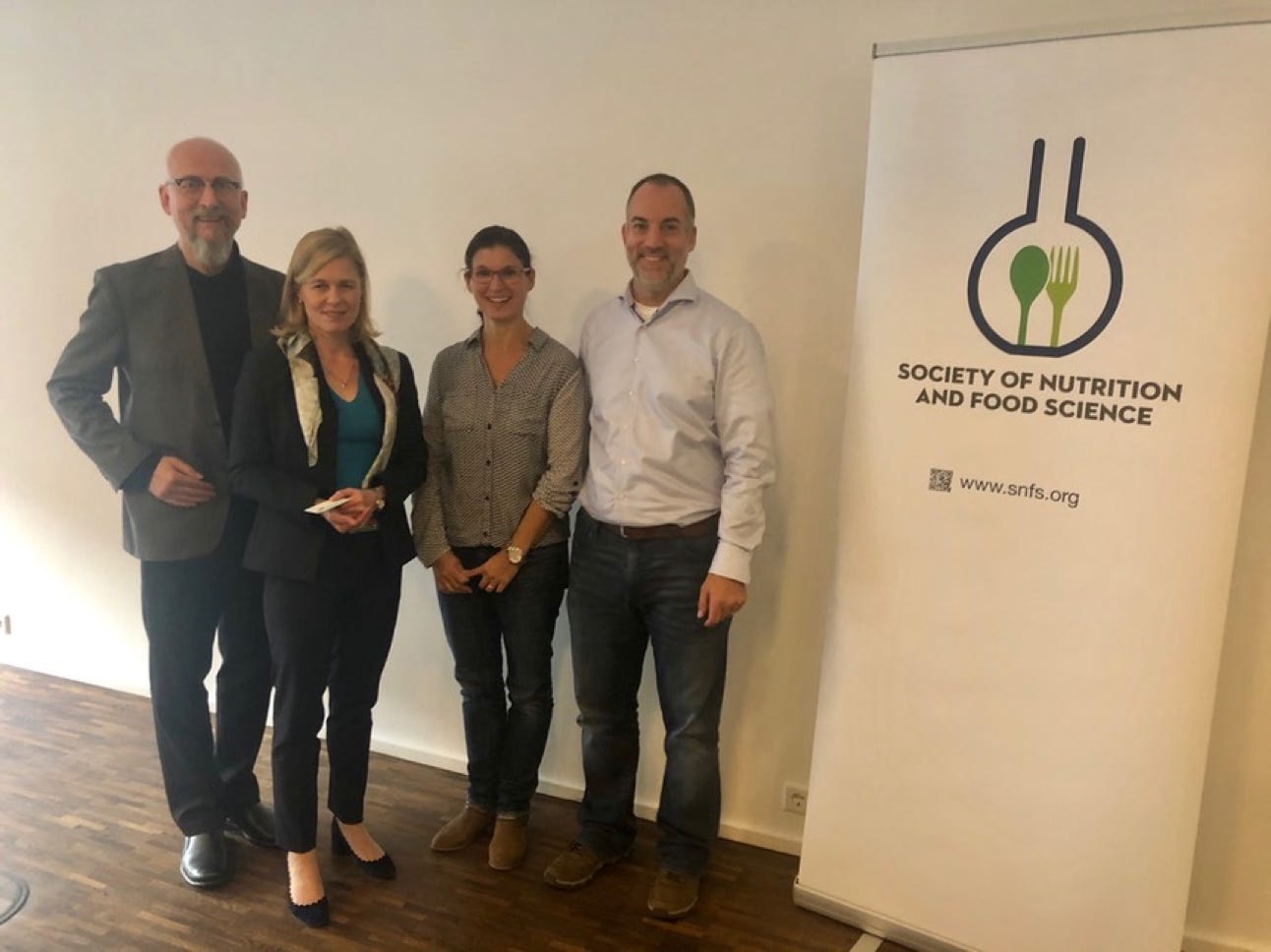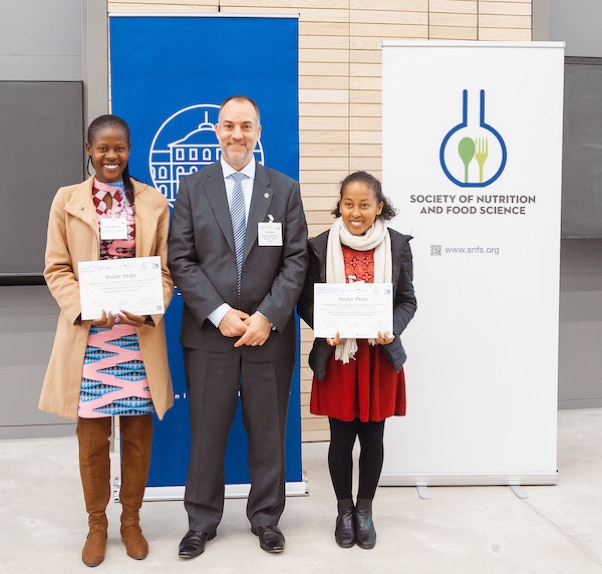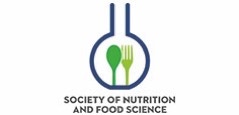
Society of Nutrition and Food Science e.V.
A not-for-profit organisation dedicated to bringing together nutrition and food scientists
Home
The Society of Nutrition and Food Science (SNFS) e.V. is a not-for-profit organisation dedicated to bringing together nutrition and food scientists and to further scientific progress and education in the field of nutrition and food science.
5th International Congress Hidden Hunger:
Improving Food and Nutrition Security through School Feeding
When: September 4-6, 2023
Where: University of Hohenheim, Stuttgart, Germany
A diet that does not meet the qualitative and quantitative requirements of a particular age group poses great risks. This is especially relevant for children and adolescents who are growing up and for whom a regular and balanced diet is an important prerequisite for healthy physical and cognitive development. The fact that in all countries worldwide the number of overweight children and adolescents who at the same time suffer from malnutrition (so-called double burden) is steadily increasing should give reason to intensify the search for causes and solutions.
Daycare and school nutrition play a special role with regard to hidden hunger. The expansion of all-day care in daycare centers and schools offers health-promoting and sustainable catering for children and adolescents to enable them to cope with the demands of the day in a physically fit, alert and focused manner. Many countries around the world are now focusing on comprehensive all-day care for children and adolescents. Daycare and school catering has increasingly become an important component of health-promoting development (physical, mental and social). It offers the unique opportunity to strengthen social participation while taking into account the needs of children and adolescents and to promote sustainability and the acquisition of competencies in the same way when linking the catering offer with practical nutrition education.
The goal of the congress is to present the entire breadth of the topic of daycare and school catering on an international level and to shed light on measures for the nutritional security of children. The further development of effective care and catering programs will be the subject of lectures, panel discussions and workshops. The question will be explored as to the different requirements and possibilities with regard to social, ecological, economic and political framework conditions and how these can be implemented in a sustainable manner. On the basis of various approaches in different countries, strategies can be identified that may be transferable to other countries.
The focus of the three-day congress is to promote dialogue between scientists, researchers, policy makers and representatives of non-governmental organizations (NGOs), civil society, the general public and the private sector, as well as other stakeholders and interested parties.
Please visit the congress website for further information and registration.
Tagungsbericht SNFS Dialog zum Download
Mit allen Sinnen genießen und sich gesund ernähren – von Vorlieben, Genussdecodierung und Geschmacksklaviaturen
Mittwoch, 29. März 2023, 16:30 Uhr bis 19:00 Uhr via Zoom
Die Zusammenfassung der Inhalte dieser Veranstaltung sowie weiterführende Informationen und Links sind nun als PDF verfügbar.
Die Symposienreihe SNFS Dialog befasst sich mit aktuellen Themen der Ernährungs- und Lebensmittelwissenschaften und richtet sich an Fachkräfte in Ernährung und Medizin, Journalisten und die interessierte Öffentlichkeit.
Es muss schmecken – ein wichtiges Kriterium für die Auswahl von Lebensmitteln. Wir essen jedoch zu viel, zu süß, zu fett und zu salzig. Ernährungsbedingte Erkrankungen sind die Folge. Änderungen in der Rezeptur verarbeiteter Lebensmittel bieten eine Möglichkeit, dieser Entwicklung erfolgreich zu begegnen. Diese Reformulierungen beeinflussen jedoch auch das sensorische Genussprofil.
Verhindern unsere Geschmacksvorlieben, dass wir uns gesund ernähren? Können wir Geschmackspräferenzen ändern? Wie gelingt es, schmackhafte und zugleich gesunde „Clean-Label“ Produkte zu gestalten? Kann uns das Wissen um Aromen bei der Zubereitung von schmackhaften Speisen helfen?
Die Referenten des SNFS-Dialogs zeigten auf, wie Geschmackswahrnehmung funktioniert, sich im Laufe des Lebens entwickelt und beeinflusst werden kann. Sie berichteten über innovative Ansätze der Lebensmittelsensorik beim Gestalten von Rezepturen für gesunde und natürliche Lebensmittel. Ein Experte für die molekularen Eigenschaften von Lebensmitteln zeigte auf, wie bei der Zubereitung von Speisen Aromen zusammenspielen und sich ergänzen können.
Gesunden Geschmack kann man lernen
Dr. Kathrin Ohla
Institut für Psychologie, Westfälische Wilhelms Universität Münster, Dept. of Food Science, Pennsylvania State University
Geschmack hat man oder nicht - dieser Mythos hält sich hartnäckig. Dabei können sich Geschmacksvorlieben im Laufe des Lebens immer wieder ändern. Wie lernt man neue gesunde Nahrungsmittel zu akzeptieren und kann man sich ungesunde Vorlieben abgewöhnen? Welche Rolle spielen die anderen Sinne – Riechen, Sehen, Hören und Fühlen – beim Schmecken? Antworten auf diese Fragen und zur Funktion des Geschmackssinns aus psychologischer Perspektive.
Einsatz der Sensorik und der Genusswertentschlüsselung für die zielgerichtete Reformulierung von Lebensmitteln
Prof. Dr. Helge Fritsch
Duale Hochschule Baden-Württemberg, Heilbronn
Bei der sogenannten Genusswertentschlüsselung werden deskriptive sensorische Methoden mit quantitativen Verbrauchertests kombiniert, um systematisch für Lebensmittel die sensorischen Schlüsselattribute herauszuarbeiten, die für Verbraucherpräferenz verantwortlich sind. Hierbei können durch ganzheitliche Betrachtungsweise der multisensorischen Wahrnehmung erfolgreich Wege zur Salz-, Zucker- und Fett-Reduktion aufgezeigt werden, bei gleichzeitigem Erhalt der Verbraucherakzeptanz. Über den Einsatz der Sensorik im Kontext der Reformulierung hinaus wird des Weiteren betrachtet, wie sich Sensorik – am Beispiel der Aromenkunde – als Inspirationsquelle für die innovative Entwicklung von Lebensmitteln nutzen lässt.
Genussvoll und erst recht gesund – die Lösung liegt in den Molekülen
Prof. Dr. Thomas A. Vilgis
Max-Planck-Institut für Polymerforschung, Mainz
Der Begriff „gesundes Essen“ hat nicht immer den besten Ruf. Schnell kommen Assoziationen wie „fade“, „wenig lecker“ oder gar „Langeweile“ in den Sinn. Das ist natürlich nicht so. Wenn diese aufgezählten Begriffe mit molekularem Leben gefüllt werden, lässt sich schnell erkennen, dass es an nichts, außer ein paar wenige Kniffen, fehlt. In diesem Vortrag kommt eine vielstimmige Flavour-Klaviatur auf Grundlage typischer Lebensmittelzusammensetzung gespielt, mit allen fünf Geschmacksrichtungen, samt komplexem Aromaspiel auf den Tisch. Ziel ist es, ein tieferes Verständnis für Lebensmittel und die Zubereitungstechniken zu erkennen. Das Fazit ist einfach: gesund ist einfach, fade war gestern.
Zertifizierung
Diese Veranstaltung wurde für die kontinuierliche Fortbildung von Inhaber*innen der Zertifikate von DGE, VDD und VDOE sowie des VFED mit 3 Punkten berücksichtigt.
Download Tagungsbericht
Tagungsbericht SNFS Dialog zum Download
Mehr Aufmerksamkeit für das Zuwenig - Mangelernährung in Deutschland
Den Tagungsbericht zum SNFS Dialog zur Mangelernährung in Deutschland können Sie hier als PDF herunterladen.
Mangelernährung ist keineswegs nur eine Erscheinung unter Schwerstkranken im klinischen Kontext, sondern ein Problem in ganz unterschiedlichen Krankheits- und Lebensphasen. Neben der Adipositas-Problematik und deren sozioökonomischen Auswirkungen sollte in Fachkreisen und Politik dem Thema Mangelernährung und deren Risiken mehr Raum gegeben werden. Denn ungenügende Energie- und Nährstoffversorgung beeinflussen die Lebensqualität und den Verlauf vieler Erkrankungen negativ und belasten das Gesundheitssystem.
Daher gilt: Genau hinschauen, frühzeitig erkennen und sofort handeln.
Zum Thema Mangelernährung in Deutschland hatte die SNFS e.V. ausgewiesene Expertinnen eingeladen, die über Häufigkeit, Ursachen und Risiken einer Mangelernährung bei Senioren, aber auch bei Jugendlichen und Erwachsenen, berichteten und Lösungsansätze aus der Beratungspraxis vorstellten:
Mangelernährung und Untergewicht bei Jugendlichen und Erwachsenen
Prof. Dr. Nanette Ströbele-Benschop, Leitung Fachgebiet Angewandte Ernährungspsychologie, Institut für Ernährungsmedizin, Universität Hohenheim, Stuttgart
Mangelernährung bei Älteren – Häufigkeit, Ursachen und Auswirkungen
Dr. rer. medic. Lindsey Otten, Ernährungswissenschaftlerin,Evangelisches Waldkrankenhaus Spandau, Berlin
Praktische Lösungsansätze aus der Ernährungsberatung und -therapie
Dipl. oec. troph.Kerstin Bernhardt, Diätassistentin, InhaberinErnährungslotsen, Köln
Zertifizierung
Diese Veranstaltung wurde für die kontinuierliche Fortbildung von Inhaber*innen der Zertifikate von DGE, VDD und VDOE sowie des VFED mit 3 Punkten berücksichtigt.
NFS Journal impact: 2020 CiteScore published
The official journal of theSociety of Nutrition and Food Science, NFS Journal, is gaining impact in the nutrition and food science communities.
After rapidly gaining in impact over the first few years following its inception in 2015 (which peaked in 2019 with a CiteScore of 9.6), NFS Journal now reached a very good CiteScore of 5.9 in 2021, which puts it in the same league as many of the established nutrition and food science journals.
Articles published in NFS Journal are thus recognized, read and cited.Make use of the increasing impact and recognition of NFS Journal and publish your next article in the society’s official organ.
Become a member of the Society of Nutrition and Food Science and benefit from the possibility to apply for a publication fee subsidary for high-quality articles published in NFS Journal.
SNFS Dialogue
Where myths and facts are far apart: sugar, sugar alcohols and sweeteners
On February 6, 2020, SNFS invited three recognized experts to present the latest research and shed light on many questions around the sweet taste of foods and its impact on human health.
Left to right: Alfred Mar, Hannelore Daniel, Anne Christin Meyer-Gerspach, Jan Frank
Experts
Prof. em. Dr. Hannelore Daniel (Professor emeritus of Nutrition Physiology, TU Munich)
Glucose and fructose metabolism: the dose makes the poison!
PD Dr. Anne Christin Meyer-Gerspach(St. Claraspital/St. Clara Forschung AG, Basel)
The latest in sugar research: sucrose and its potential replacements
Univ. Lektor Dipl. Ing. Alfred Mar (Lecturer at BOKUand President of ICC Austria)
Technology of sugars, sugar alcohols, and non-caloric sweeteners in pastry
Please click here for more details, the symposium summary, and slides.
SNFS Dialogue
Food intolerances and allergies - Lifestyle diseases or metabolic disorders of increasing importance?
On October 21, 2019, SNFS, together with recognized experts, reviewed "food intolerances and allergies" and examined the diverse adverse reactions to foods, their pathophysiological basics, frequencies in the population, and agreed on recommendations for actions.
Fructose intolerance, lactose intolerance, celiac disease, non-celiac gluten sensitivity, allergies to milk protein, fish, nuts and so on... More and more people, or so it seems, report that they do not tolerate one or more food items in their diets. This is mirrored by a growing number of "Free of"-foods offered in supermarkets.
The causes of these food intolerances are manifold, as are their symptoms. The constant presence of nutrition topics and cooking shows in the media and the resulting growing awareness of consumers for health and nutrition topics may contribute to a heightened sensitivity of the population and increasing numbers of self-diagnosed intolerances and allergies.
Left to right: Jörg Kleine-Tebbe, Claudia Laupert-Deick, Nanette Ströbele-Benschop, Jan Frank
Prof. Dr. Jan Frank, President of SNFS and Professor of Food Biofunctionality at the University of Hohenheim, chaired the event and the lively discussion around the topic among journalists, nutrition experts and the general public.
Dr. Claudia Laupert-Deick, Head of the Practice for Nutrition Therapy and Coaching in Bonn, talked about the current trends towards food intolerances and explained for whom it really makes sense to omit foods. "More and more people believe that they can no longer tolerate certain foods. But this assumption cannot be confirmed scientifically“, she affirmed. But for humans without a diagnosed allergy or intolerance “Free of “-products do not necessarily provide a health benefit; on the contrary. If, for example, gluten (from wheat) is eliminated from the diet, the consumption of whole grain products and simultaneously of dietary fibre may be reduced. Only a small percentage of the German population has a food allergy. Dr. Laupert-Deick stressed: "It requires a differentiated procedure to diagnose food intolerances and to treat them properly and in a health-promoting way".
Prof. Dr. Jörg Kleine-Tebbe from the Allergy and Asthma Center Westend in Berlin spoke about food allergies and intolerances and highlighted the boundary between fashionable indisposition and life-threatening disease. "Food allergies are immunological reactions against food constituents," he explained. One differentiates between primary and secondary food allergies. "Primary food allergies manifest early in life, in infants and young children, and are immunological reactions to proteins from e. g. cow milk, chicken eggs, wheat, peanuts, tree nuts and fish", the expert said. Secondary food allergies are different, Prof. Dr. Kleine-Tebbe explained: "They manifest later in life and typically in persons who are allergic to airborne allergens, such as pollen. The presence of structurally related allergens in foods then causes the cross-reactivity also referred to as secondary food allergies." Even though 14% of the European population have a self-reported food allergy, only 1% of the population has this confirmed by a physician through the presence of antibodies in the blood. However, only 0.2% of Europeans show allergic reactions when ingesting the respective allergen. Prof. Kleine-Tebbe concluded: “The presence of antibodies alone does not make an allergy. Only in combination with allergic reactions to the food in question, can a food allergy be confirmed.” Avoiding certain foods is only necessary for persons with a confirmed allergy and not recommended for the general public.
Prof. Dr. Nanette Ströbele-Benschop from the Institute of Nutritional Medicine at the University of Hohenheim talked about the psychological and social aspects of food intolerances and allergies. People suffering from these disorders find themselves in a difficult situation: "Depending on the severity of the food allergy, the emotional and social burden can be very high, in particular for sick children and their relatives - especially the mother", she stressed. Children may be singled out at social events as the “odd ones who need a special diet” and parents may experience the need to explain the dietary restrictions of their children to strangers and caterers as stressfull. Or they may suffer from anxiety when being forced to leave the welfare of their children, who may suffer life-threatening consequences upon exposure to, for example, peanuts, in the hands of others. The quality of life of allergy patients and their close relatives may be severely reduced, studies find. But the extent of the psychological burden is rarely recognised or properly addressed by physicians, who focus on treating the allergic reactions. “Tending to the psychological component in order to reduce the emotional burden, may be just as important for ensuring the wellbeing and health of patients in the long run”, concluded the expert.
Overview speakers and presentation titles:
Dr. Claudia Laupert-Deick (Practice for Nutrition Therapy and Coaching, Bonn):
Nutrition trend Food intolerances - For whom does it really make sense to omit food?
Prof. Dr. Jörg Kleine-Tebbe (Allergy and Asthma Center Westend, Medical Practice Hanf, Ackermann & Kleine-Tebbe, Berlin): Allergies and food intolerances: between lifestyle diseases and death risk
Prof. Dr. Nanette Ströbele-Benschop (University of Hohenheim, Institute of Nutritional Medicine, Stuttgart): Psychological and social aspects of food intolerances and allergies
Further information on the topic is available here:
German Society for Allergology and Clinical Immunology (Deutsche Gesellschaft für Allergologie und klinische Immunologie): www.dgaki.de
Deutscher Allergie- und Asthmabund (German Allergy and Asthma Association): www.daab.de
Press release:
Please read the joint press release of SNFS and the University of Hohenheim for further details.
4th Congress Hidden Hunger
Hidden hunger and the transformation of food systems: How to combat the double burden of malnutrition?
From February 27 to March 1, 2019, the 4th Congress Hidden Hunger took place at the University of Hohenheim in Stuttgart, Germany. The topic of hidden hunger with reference to the worldwide problem of overweight as well as the global nutritional situation were discussed from the perspectives of governmental and non-governmental organizations, politicians, economists, nutritionists and agricultural scientists. Various disciplines and scientists from high- and low-income countries from allover the world were brought together to focus on the links and gaps between science and reality in all parts of the world. The biennial global meeting of members belonging to the scientific community, representatives from politics, government and the media as well as members of civil society organizations, advocacy groups and private and public sector bodies, was organized by the University of Hohenheim together with the Society of Nutrition and Food Science (SNFS).
Three young researchers were awarded the SNFS Best Poster Prize. Two of the awardees received their award certificate from SNFS President Prof. Frank during the congress (see photo below).
Photo curtesy of SEZ / Stefan Steinbach
